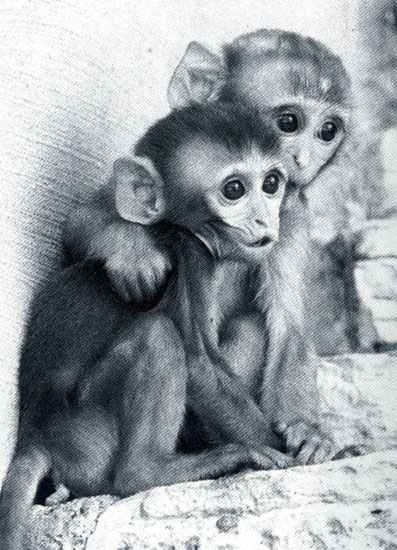 |
The EVOLUTION of MORALITY |
FRAME 17 |
 |
|
 |
> MORAL MOTIVATION OR INTENT (NEUROPHYSIOLOGY AND PSYCHOLOGY)
Humans and some other primates exhibit moral sentiments at a very early age.
 One way to assess foundational human motivation is to observe behavior before possible learning or training. Human infants (age 18 months), for example, frequently help adults in simple problematic tasks in a lab setting — without being asked and without reward. Young chimps, too (ages 3 to 4½ years), exhibit the same behavior, at least when they are able to understand the incomplete task (Wanneken and Tomasello 2006). A macaque (or rhesus monkey, Macaca mulatta) of a captive troop, only a few months old, was also observed hugging another younger member who had just been assaulted sexually by one of the adult males: apparent unsolicited consolation (de Waal 1996). Simple moral tendencies seem innate in humans and other primates, at least early in life. The question remains how such feelings evolved, and whether the social environment was relevant historically (see following section).
One way to assess foundational human motivation is to observe behavior before possible learning or training. Human infants (age 18 months), for example, frequently help adults in simple problematic tasks in a lab setting — without being asked and without reward. Young chimps, too (ages 3 to 4½ years), exhibit the same behavior, at least when they are able to understand the incomplete task (Wanneken and Tomasello 2006). A macaque (or rhesus monkey, Macaca mulatta) of a captive troop, only a few months old, was also observed hugging another younger member who had just been assaulted sexually by one of the adult males: apparent unsolicited consolation (de Waal 1996). Simple moral tendencies seem innate in humans and other primates, at least early in life. The question remains how such feelings evolved, and whether the social environment was relevant historically (see following section).
|

 |
|
|